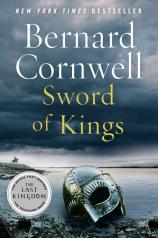Sword of Kings
Review
Sword of Kings
The other day, one of my twin daughters informed my wife that her backpack was jinxed. When quizzed on why this was, she explained as follows. She had taken the backpack on three trips out of state. The first trip, she had come down with a strep infection. The second trip, we stumbled into what we initially thought was a mass shooting. It turned out to be a false alarm --- a practical joke by a few firecracker-wielding delinquents --- but we were all frightened as it happened. The third trip, I managed to fall off a curb and almost fractured my leg; I was hobbling around on crutches for three weeks afterwards. Ergo ipso facto: the backpack was jinxed.
I do not believe in jinxes, but there is a wonderful --- a terrific --- argument for, you know, just staying home and not going anywhere. The root word for “travel” is travail, a Middle English word meaning, according to the Oxford English Dictionary, to “engage in painful or laborious effort,” and anyone who has ever had to lug three suitcases and two infant car seats through the Orlando airport knows intimately what this means. The root word for travail is, again according to the OED, medieval Latin trepalium, which means something like “instrument of torture,” and there you have it.
"SWORD OF KINGS ranks high in the Cornwell pantheon, not only for its robust storytelling but also for its heroic and redemptive qualities."
If SWORD OF KINGS has a subtext, it is “I should have stayed home in bed.” Lord Uhtred, master of the remote fortress of Bebbanburg, is goaded (there’s that instrument of torture again) into leaving home and mucking about the confused and confusing politics of Mercia and Wessex. The king is dying, the succession is in doubt, and there is the tiny matter of a raid against Northumbrian shipping that has to be avenged. Uhtred and a small cohort set sail to the mouth of the Thames to initially rescue the queen --- and, if there’s a chance, to redeem his oath that one of the contenders for the kingdom is to be killed.
Uhtred’s mission starts out as a misadventure and becomes a travail during a disastrous side trip to London, where he runs across a new enemy in his old house and is trapped behind enemy lines in a conquered city. A rush to escape --- halted temporarily by the meting out of a little private, and very rough, justice --- is thwarted by bad luck and poor planning. When Uhtred is finally able to make his move and head back in the direction of Bebbanburg, he is forced to lead a small army of children and slaves in the bargain.
What separates SWORD OF KINGS from the other Cornwell books is the way that Uhtred’s travail becomes something greater. It becomes, quite literally, an ordeal, and the Lord of Bebbanburg is forced to make a terrible and noble choice. It should come as no surprise to the patient reader that Uhtred suffers greatly in this book --- he has survived slavery and disgrace and the shield wall, and has come through stronger and wiser --- but the nature of the experience is so shattering that it’s not merely commonplace to see Uhtred fight and scheme through it, and come through the shield wall once again to an unlikely victory. It’s heartening, not only because it shows the deep-seated nobility of a character who boasts of his monstrous deeds, but because it bucks a longstanding trend in the series. Uhtred is all too often fortune’s fool, at the mercy of his capricious gods, but here he does more --- he abases himself to the point of near-death, becoming a living and redemptive sacrifice. It’s a startling turn for the character, but one that is well and fully earned.
Of course, Uhtred gets back in the battle, and although (by the standards of the series) this isn’t much of a fight, you honestly can’t go wrong with Bernard Cornwell at the controls when the time comes to form up in the shield wall and let sword and spear collide. It would have been perfectly splendid to have an installment of the Saxon Tales that featured Uhtred in the heat of battle, but to have a wounded and chastened Uhtred recover his honor in a noble conflict is marvelous indeed. SWORD OF KINGS ranks high in the Cornwell pantheon, not only for its robust storytelling but also for its heroic and redemptive qualities.
Reviewed by Curtis Edmonds on November 26, 2019
Sword of Kings
- Publication Date: November 24, 2020
- Genres: Fiction, Historical Fiction
- Paperback: 352 pages
- Publisher: Harper Paperbacks
- ISBN-10: 006256322X
- ISBN-13: 9780062563224




